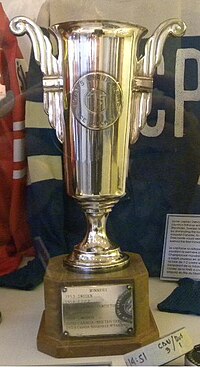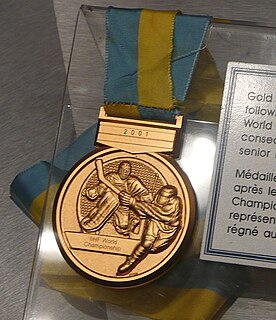
The Ice Hockey World Championships are an annual international men's ice hockey tournament organized by the International Ice Hockey Federation (IIHF). First officially held at the 1920 Summer Olympics, it is the sport's highest profile annual international tournament. The IIHF was created in 1908 while the European Championships, the precursor to the World Championships, were first held in 1910. The tournament held at the 1920 Summer Olympics is recognized as the first Ice Hockey World Championship. From 1920 to 1968, the Olympic hockey tournament was also considered the World Championship for that year.

The men's ice hockey tournament at the 1976 Winter Olympics in Innsbruck, Austria, was the 13th Olympic Championship. The Soviet Union won its fifth gold medal. Games were held at the Olympiahalle Innsbruck.

The men's ice hockey tournament at the 1952 Winter Olympics in Oslo, Norway, was the seventh Olympic Championship, also serving as the 19th World Championships and the 30th European Championships. The tournament was mainly played at the Jordal Amfi Arena, as well as the stadiums at Dælenenga, Kadettangen (Sandvika), Marienlyst (Drammen) and Lillestrøm (Lillestrøm). Canada, represented by the Edmonton Mercurys, won its sixth Olympic gold medal and 15th World Championship. Highest finishing European team Sweden won the bronze medal and its sixth European Championship.
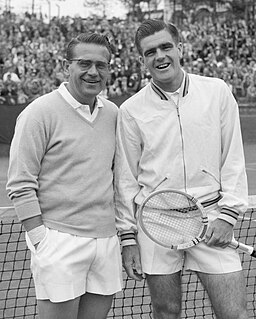
Jaroslav Drobný was a World No. 1 amateur tennis and ice hockey champion. He left Czechoslovakia in 1949 and travelled as an Egyptian citizen before becoming a citizen of the United Kingdom in 1959, where he died in 2001. In 1954, he became the first and, to date, only player with African citizenship to win the Wimbledon Championships.

The 1976 Canada Cup was an international ice hockey tournament held September 2 to 15, 1976, in Ottawa, Toronto, Montreal, Winnipeg and Quebec City in Canada as well as in Philadelphia, in the United States. It was the first of five Canada Cup tournaments held between 1976 and 1991, organized by Alan Eagleson, and sanctioned by the International Ice Hockey Federation (IIHF), Hockey Canada and the National Hockey League (NHL).
The 1984 Labatt Canada Cup was a professional international ice hockey tournament played during the first three weeks of September 1984. The best-of-three final took place between Canada and Sweden, with Canada winning a two game sweep. Canadian forward John Tonelli was named the tournament's most valuable player.
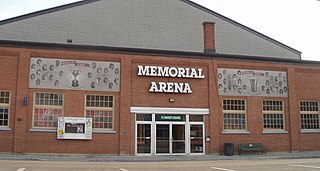
The Belleville McFarlands were a Canadian senior ice hockey team in the Ontario Hockey Association (OHA) from 1956 to 1961. The McFarlands were based out of Belleville, Ontario, playing home games at the Belleville Memorial Arena.
The 1931 Ice Hockey World Championship was the fifth World Championship, an annual international ice hockey tournament. It took place between 1 and 8 February 1931 in Krynica, Poland. The tournament was won by Canada who were represented by the University of Manitoba Grads team, claiming their fifth world championship title by finishing on top of the group in the final round with a total of nine points. The United States finished second to win the silver medal, losing only one game to Canada and Austria finished third for the bronze medal. The host nation of Poland finished fourth at the tournament after winning one game, tying one, and losing three in the final round.
The 1933 Ice Hockey World Championships were held between February 18 and February 26, 1933, in Prague, Czechoslovakia.

The 1985 Ice Hockey World Championships took place in Prague, Czechoslovakia from 17 April to 3 May. Eight teams took part, with each team playing each other once. The four best teams then played each other once more with no results carrying over, and the other four teams played each other again to determine ranking and relegation. This was the 50th World Championships, and also the 61st European Championships of ice hockey. The home side, Czechoslovakia, became world champions for the 6th time, and the Soviet Union won their 23rd European title. For the European Championship, only games between European sides in the first round are included.
The 1982 Ice Hockey World Championships took place in Finland from the 15 April to the 29 April. The games were played in Helsinki and Tampere with eight teams playing a single round-robin, followed by the top four teams playing each other once more. This was the 48th World Championships, and also the 59th European Championships of ice hockey. The Soviet Union became World Champions for the 18th time, and also won their 21st European Championship.
The 1978 Ice Hockey World Championships took place in Prague, Czechoslovakia from 26 April to 14 May. Eight teams took part, with each team playing each other once in the first round, and then the four best teams meeting in a new round. This was the 45th World Championships, and also the 56th European Championships. The USSR won for the fifteenth time, narrowly defeating the incumbent Czechoslovaks.
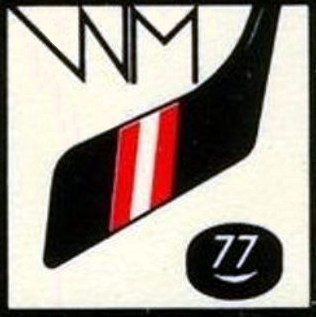
The 1977 Ice Hockey World Championships took place in Vienna, Austria from 21 April to 8 May. Eight teams took part, first playing each other once, then the four best teams advancing to a new round. The tournament was also the 55th ice hockey European Championship. Czechoslovakia won for the fifth time, and second in a row, claiming their 14th and final European title as well.

The Canadian men's national under-20 ice hockey team is the ice hockey team representing Canada internationally in under-20 competition. Their primary participation in this age group comes at the International Ice Hockey Federation's World Junior Championship, held annually every December and January. The team also participates in various exhibition matches and occasional exhibition series, such as the 2007 Super Series against their Russian counterparts, an eight-game exhibition series commemorating the 35th anniversary of the 1972 Summit Series.
The 1972 Ice Hockey World Championships was the 39th edition of the Ice Hockey World Championships. The tournament was held in Prague, Czechoslovakia from 7 to 22 April 1972, and the Czechoslovakia national team won the tournament, the third time they had done so and first since 1949, ending the Soviet Union's streak of nine consecutive titles. In addition it was the Czechoslovaks' 12th European title.
The 1939 Ice Hockey World Championships were held between February 3 and February 12, 1939, in Zürich and Basel, Switzerland. Austria had been annexed by Germany in 1938, and four Austrians played this tournament in German jerseys. The fourteen teams participating in the 1939 World Championship were initially divided into four preliminary groups: two groups of four and two groups of three. The top two teams in each group advanced to the second round. The eight teams in the second round played in two groups of four, with the top two from each group advancing to the third (final) round. The six teams not advancing to the second round played a consolation round in two groups of 3 teams with the winners of each group playing a one-game play-off for 9th place. The four teams not advancing from the second round played a consolation round for placed 5 through 8.
The 14th Ice Hockey World Championships and 25th European Championship was the first after the Second World War. It was held from 15 to 23 February 1947 at Štvanice Stadium in Prague, Czechoslovakia. Eight teams participated, but the competition was notably missing the reigning world champion, Canada. The world champion was decided for the first time by round robin league play. Czechoslovakia won the world championship for the first time and the European championship for the seventh time. King Gustav V had sent a telegram of congratulations to the Swedish team after beating the Czechoslovaks, but they had barely finished celebrating when they were upset by the Austrians, costing them the gold medal.
Statistics of Czechoslovak First League in the 1961–62 season.
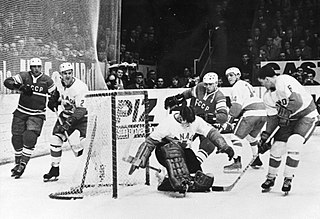
The 1967 Ice Hockey World Championships was the 34th edition of the Ice Hockey World Championships. The tournament was held in Vienna, Austria from March 18 to March 29, 1967. The Soviet Union won the tournament for the fifth straight year, Sweden won the silver medal, and Canada claimed the bronze medal.
The 1963 Ice Hockey World Championships was the 30th edition of the Ice Hockey World Championships. The tournament was held in Stockholm, Sweden from March 7 to March 17, 1963. The Soviet Union won the tournament for the third time, starting their roll of nine straight championships. For the Soviets it was also their seventh European title. A new tie-breaking method was introduced, if there was a tie for a medal, it would be broken by the goal differential between only the top five placed nations. The Swedes, on the final day, had nearly everything possible go against them. If they had won or tied against Czechoslovakia, or if Canada could have won or tied against the Soviets, or if the Americans had beaten the East Germans, they would have been crowned champions. The Czechoslovaks propelled themselves past Canada on the final day to capture the Bronze.
